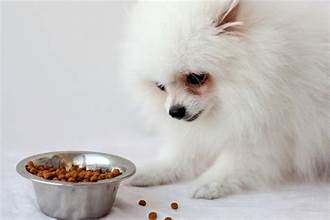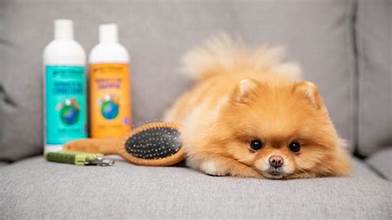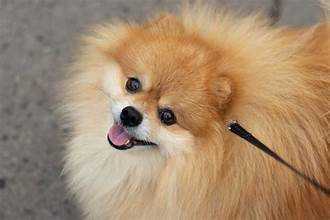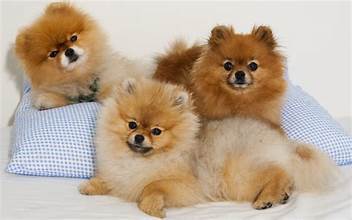Pomeranians are small, fluffy, and full of personality, making them a favorite among dog lovers. Originating from the Pomerania region in Europe, these tiny canines are a member of the Spitz family, which includes larger breeds like the Alaskan Malamute and the Samoyed. Known for their distinctive “fox-like” faces, Pomeranians have a double coat in various colors. If you’re considering bringing a Pomeranian into your home, here’s what you need to know.
Dietary Needs
Pomeranians have specific dietary requirements to maintain their health and energy levels:
1. High-Quality Protein:
Ensure their diet includes protein sources such as chicken, turkey, lamb, or fish.
2. Balanced Diet:
A balanced diet with proteins, fats, and carbohydrates is essential. Dog food that has the AAFCO (Association of American Feed Control Officials) standards.
3. Portion Control:
Pomeranians are prone to obesity due to their small size. Feed them measured portions and avoid overfeeding.

4. Hydration:
Always provide fresh water. Pomeranians are active and need to stay hydrated.
5. Treats:
Occasionally, give out only healthy treats. Avoid human food, which can be harmful.
Medical Issues
Pomeranians are prone to certain health conditions:
1. Dental Problems:
Their small mouths can lead to overcrowded teeth, making them susceptible to dental diseases. Regular dental check-ups and brushing are essential.
2. Luxating Patella:
This is where their kneecap may dislocate. It’s common in small breeds and may require surgery in severe cases.
3. Collapsed Trachea:
This condition affects the windpipe and can cause coughing and breathing difficulties. Using a harness instead of a collar can help prevent this.
4. Hypothyroidism:
Pomeranians can suffer from an underactive thyroid. Blood tests will diagnose and manage this condition.
5. Heart Issues:
Heart diseases like mitral valve disease can occur, especially in older Pomeranians. Regular veterinary check-ups are crucial.
Grooming
Pomeranians have a double thick coat that needs regular maintenance:

1. Brushing:
Brush their coats at least 2-3 times weekly to prevent matting and reduce shedding. During shedding seasons, brushing should be done daily.
2. Bathing:
Bathe your Pomeranian every 4-6 weeks using a dog-specific shampoo to keep their coat clean and healthy.
3. Trimming:
Regularly trim their nails to prevent overgrowth, which can cause discomfort.
4. Ears and Eyes:
Check their ears weekly for signs of infection, clean them with a vet-recommended solution, and wipe their eyes to prevent tear stains.
5. Professional Grooming:
Consider professional grooming every few months to maintain their coat and overall hygiene.
Exercise
Despite their small size, Pomeranians are active and energetic:
1. Daily Walks:
They need at least one daily walk to burn off energy and stay fit.

2. Playtime:
Engage them in interactive play with toys to keep them mentally and physically stimulated.
3. Socialization:
Pomeranians enjoy socializing with other dogs and people. Regular socialization helps prevent behavioral issues.
Training
Pomeranians are very smart and are eager to please, making them easy to train:
1. Positive Reinforcement:
Use praise and play to encourage good behavior.
2. Consistency:
Consistency with commands and training routines to reinforce learning.
3. Socialization:
Early socialization is crucial. To build confidence, expose your Pomeranian to different environments, people, and animals. This commitment to socialization will ensure your Pomeranian is well-adjusted and happy.
4. Obedience Training:
Enroll in a puppy obedience class to help with basic commands and proper behavior.
Living Arrangements
Pomeranians can thrive in various living situations:
1. Apartment Living:
They are well-suited for apartment living because they are small but need regular exercise.
2. Secure Environment:
Ensure your home is secure, as Pomeranians are curious and can escape through small openings.
3. Family Interaction:
Pomeranians are social dogs and enjoy being part of the family. They should not be left alone for long periods.
Conclusion
Pomeranians are not just pets but delightful companions with charming personalities and fluffy coats. By understanding their dietary needs, potential medical issues, grooming requirements, exercise needs, and training, you can ensure that your Pomeranian lives a happy and healthy life. If you’re ready for a loving and energetic addition to your family, a Pomeranian might be the perfect choice, bringing joy and excitement into your life.
Disclosure: This page may contain an affiliate link to Bubblespaw.com & Amazon.com. We might receive a commission if you follow them and purchase anything from the recommended products. I can assure you that I never recommend anything I don’t trust. Thanks for supporting positvelypets.com!




